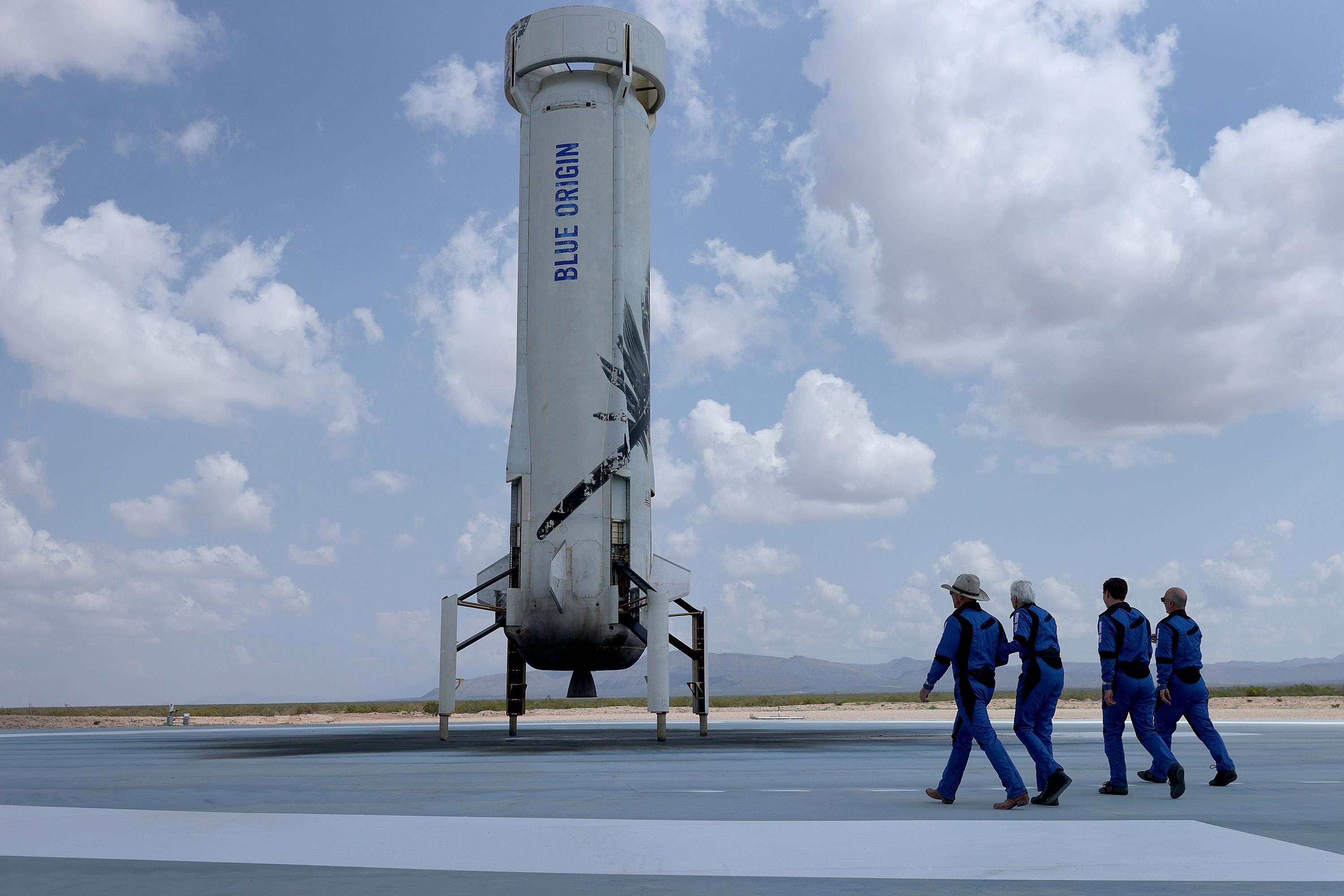Jeff Bezos and three other passengers spent roughly 10 minutes Tuesday morning flying on a round trip to space in the New Shepard, a rocket ship built by the billionaire’s aerospace company Blue Origin. The New Shepard took off at around 9:12 a.m. from its launch site near Van Horn, Texas, and flew just above the Kármán Line, a boundary 100 kilometers above the ground that many consider to demarcate the earth from space. After spending a few minutes in zero gravity, the crew descended back down to earth in the New Shepard capsule.
The flight was Blue Origin’s first with people aboard. In its publicity for the mission, the company has said that it wants to send more people into space and will soon start selling tickets, though details about the price and purchasing process are scarce. Other private space companies like Virgin Galactic and SpaceX are planning to sell seats on their vessels, as well. Since 2001, when businessman Dennis Tito became the first person ever to pay for a trip to space, the space tourism industry has seen ups and downs as companies struggled to find ways to make it commercially viable. So far, only a handful of people have been able to pay their way into space. (Even NSYNC singer Lance Bass wasn’t able to raise the $20 million he needed to fly with a Russian space crew in 2002.) Now, the richest people in the world seem dead set on making regular private space flights a reality. Does this really hail a new era for more widely available trips to space?
At least in the near future, civilians aspiring to visit the cosmos will have to be well-connected or have hundreds of thousands, and perhaps even millions, of dollars to spare. Only one seat was up for sale on the New Shepard for Tuesday’s flight. An anonymous bidder won it in an auction in June for $28 million, though they were unable to attend due to a scheduling conflict and will instead join a future flight. The seat ultimately went to Oliver Daemen, an 18-year-old from the Netherlands who became the youngest person ever to visit space. His father, the CEO of a private equity firm, had also bid on the seat and was eventually able to buy it when the winner dropped out. However, Blue Origin has not disclosed how much the elder Daemen paid. The other two passengers were Jeff Bezos’ brother Mark and Wally Funk, a renowned aviator who trained as an astronaut in the 1960s before the U.S. government canned its “women in space” program.
Besides the $28 million figure, Blue Origin has been fairly tight-lipped about its pricing, though it did say on Tuesday that ticket sales are now open to the general public and directed interested customers to email astronauts@blueorigin.com. Blue Origin did not respond to an inquiry about the price of tickets, though Reuters reported that the company initially estimated in 2018 that they would run for $200,000 to $300,000. Bezos also said at a press conference after his flight that “the demand is very, very high” for seats and that Blue Origin has already reached $100 million in private sales, meaning that the company will have to schedule more trips and build more rockets. There are plans for two more flights carrying civilians this year.
Flights through other space tourism services will also cost you at least a few hundred thousand dollars. Virgin Galactic was initially offering ticket reservations for $250,000 and managed to sell about 600 of them before stopping in 2014 due to a test crash. Following its first spaceflight carrying human passengers last week (including founder Richard Branson), the company is expected to reopen ticket sales soon at a higher price for when it starts flying people regularly in 2022. (At the moment, people can place a $1,000 deposit to reserve a ticket.) Analysts estimate that they’ll ultimately cost between $300,000 and $400,000. At a presentation to investors in 2019, however, Virgin Galactic executives signaled that after this initial hike, their long-term goal was to drastically lower prices to make the service available to a wider range of people—that is, they hope to be able to do business with the rich instead of just the uber-rich. In discussing the size of the market for tickets, they mused that 1.78 million people had a net worth of more than $10 million and could hypothetically afford a $100,000 ticket, while 5.07 million people have a net worth of more than $5 million and might be willing to pay $50,000 for a ticket.
Virgin Galactic and Blue Origin are only offering suborbital flights, though. If you want to spend more than just a few minutes in space, you’ll likely have to pay tens of millions of dollars. The space tourism company Axiom is flying three people early next year to the International Space Station in SpaceX’s Crew Dragon capsule and will stay there for eight nights; seats are $55 million a pop. That includes the $35,000 per-night cost of living at the space station to cover the cost of life support systems and power. While that rate could get you a suite with a basketball court or bowling alleys in Las Vegas, the Axiom crew will reportedly be spending their nights in sleeping bags.
Future Tense is a partnership of Slate, New America, and Arizona State University that examines emerging technologies, public policy, and society.
